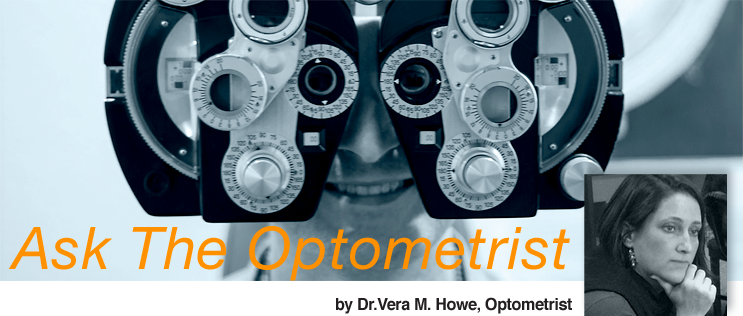Answers from Dr. Vera Howe – Optometrist
Why are eye exams important?
Eye exams are an essential piece of your overall health. Having your eyes checked annually will help detect eye problems at an early stage and give you a chance to correct vision impairments.
Do you take insurance? What about other forms of Payment?
Cash, check and credit card are accepted. We are in-network providers for Blue Shield Blue Cross, United Health Care, Cigna, Aetna, Midlands Choice, Coventry, Humana and Medicare. We are in-network providers for Vision Service Plan (VSP). Please call if you have questions about insurance and we will be happy to answer them.
What to expect when you arrive?
When you arrive at Optix Eye Design you’ll be asked to update your contact and insurance information. After a short wait you’ll be called back in for your eye exam.
What are the components of an eye exam?
An eye exam consists of two components. We’ll review your vision history including your family vision history. We’ll then perform eye tests.
What eye tests can I expect to go through?
- Visual evaluation – The doctor will check how well you see and then perform a refraction. Refraction is the part of the exam where you and the doctor come up with a prescription for glasses. The doctor also determines how well your eyes work together. You and the doctor will discuss your varied visual needs and come up with a plan to help you see well at all distances
- Ocular Health evaluation – The doctor will check the overall health of your eyes. This includes microscopic evaluation of the inside and outside of your eyes. A glaucoma check will be performed, and dilation may be performed.
Will you dilate my eyes?
It depends on many factors. Dilation is performed by placing drops in your eyes that make the pupil large so we can get a better view of the structures in your eye. No other procedure is as good at evaluating the health of the inside of the eye as having a dilated eye exam. However, we realize many people have limited time schedules or have activities to attend. You can discuss this with the doctor and decide how to proceed.
What’s the Difference between an Optician, an Optometrist and an Ophthalmologist?
An Optician is a professional in the field of designing, finishing, fitting and dispensing of eyeglasses and contact lenses, based on an eye doctor’s prescription. The optician may also dispense colored and specialty lenses for particular needs as well as low-vision aids and artificial eyes
An Optometrist is a health care professional who is state licensed to provide primary eye care service. These services include comprehensive eye health and vision examinations; diagnosis and treatment of eye disease and vision disorders; the detection of general health problems; the prescribing of glasses, contact lenses, low vision rehabilitation, vision therapy, and medications; the performing of certain surgical procedures; and the counseling of patients regarding their surgical alternatives and vision needs as related to their occupations, avocations and lifestyle. The optometrist has completed undergraduate education in a college or university and four years of professional education at a college of optometry, leading to the doctor of optometry (O.D.) degree. Some optometrists complete a residency.
An Ophthalmologist is a physician (doctor of medicine (M.D.) or doctor of osteopathy (D.O.) who specializes in the care of the eyes and visual system in the prevention of eye disease and injury. The ophthalmologist has completed four or more years of college premedical education, four or more years of medical school, one year of internship, and three or more years of specialized medical and surgical training and experience in eye care. The ophthalmologist is a physician who is qualified to diagnose, treat and manage all eye and visual system problems, and is licensed by a state regulatory board to practice medicine and surgery. An ophthalmologist is not trained to provide vision therapy.



